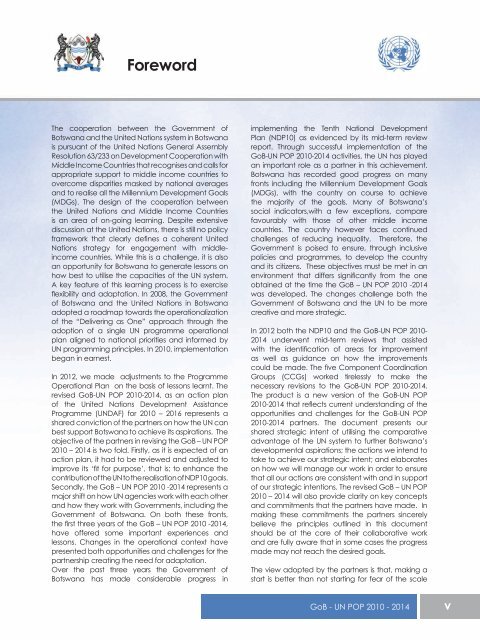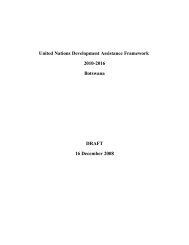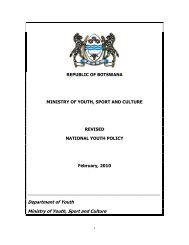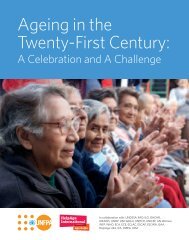GoB-UN POP 2010-2014 - UNFPA Botswana
GoB-UN POP 2010-2014 - UNFPA Botswana
GoB-UN POP 2010-2014 - UNFPA Botswana
- No tags were found...
Create successful ePaper yourself
Turn your PDF publications into a flip-book with our unique Google optimized e-Paper software.
ForewordThe cooperation between the Government of<strong>Botswana</strong> and the United Nations system in <strong>Botswana</strong>is pursuant of the United Nations General AssemblyResolution 63/233 on Development Cooperation withMiddle Income Countries that recognises and calls forappropriate support to middle income countries toovercome disparities masked by national averagesand to realise all the Millennium Development Goals(MDGs). The design of the cooperation betweenthe United Nations and Middle Income Countriesis an area of on-going learning. Despite extensivediscussion at the United Nations, there is still no policyframework that clearly defines a coherent UnitedNations strategy for engagement with middleincomecountries. While this is a challenge, it is alsoan opportunity for <strong>Botswana</strong> to generate lessons onhow best to utilise the capacities of the <strong>UN</strong> system.A key feature of this learning process is to exerciseflexibility and adaptation. In 2008, the Governmentof <strong>Botswana</strong> and the United Nations in <strong>Botswana</strong>adopted a roadmap towards the operationalizationof the “Delivering as One” approach through theadoption of a single <strong>UN</strong> programme operationalplan aligned to national priorities and informed by<strong>UN</strong> programming principles. In <strong>2010</strong>, implementationbegan in earnest.In 2012, we made adjustments to the ProgrammeOperational Plan on the basis of lessons learnt. Therevised <strong>GoB</strong>-<strong>UN</strong> <strong>POP</strong> <strong>2010</strong>-<strong>2014</strong>, as an action planof the United Nations Development AssistanceProgramme (<strong>UN</strong>DAF) for <strong>2010</strong> – 2016 represents ashared conviction of the partners on how the <strong>UN</strong> canbest support <strong>Botswana</strong> to achieve its aspirations. Theobjective of the partners in revising the <strong>GoB</strong> – <strong>UN</strong> <strong>POP</strong><strong>2010</strong> – <strong>2014</strong> is two fold. Firstly, as it is expected of anaction plan, it had to be reviewed and adjusted toimprove its ‘fit for purpose’, that is; to enhance thecontribution of the <strong>UN</strong> to the realisation of NDP10 goals.Secondly, the <strong>GoB</strong> – <strong>UN</strong> <strong>POP</strong> <strong>2010</strong> -<strong>2014</strong> represents amajor shift on how <strong>UN</strong> agencies work with each otherand how they work with Governments, including theGovernment of <strong>Botswana</strong>. On both these fronts,the first three years of the <strong>GoB</strong> – <strong>UN</strong> <strong>POP</strong> <strong>2010</strong> -<strong>2014</strong>,have offered some important experiences andlessons. Changes in the operational context havepresented both opportunities and challenges for thepartnership creating the need for adaptation.Over the past three years the Government of<strong>Botswana</strong> has made considerable progress inimplementing the Tenth National DevelopmentPlan (NDP10) as evidenced by its mid-term reviewreport. Through successful implementation of the<strong>GoB</strong>-<strong>UN</strong> <strong>POP</strong> <strong>2010</strong>-<strong>2014</strong> activities, the <strong>UN</strong> has playedan important role as a partner in this achievement.<strong>Botswana</strong> has recorded good progress on manyfronts including the Millennium Development Goals(MDGs), with the country on course to achievethe majority of the goals. Many of <strong>Botswana</strong>’ssocial indicators,with a few exceptions, comparefavourably with those of other middle incomecountries. The country however faces continuedchallenges of reducing inequality. Therefore, theGovernment is poised to ensure, through inclusivepolicies and programmes, to develop the countryand its citizens. These objectives must be met in anenvironment that differs significantly from the oneobtained at the time the <strong>GoB</strong> – <strong>UN</strong> <strong>POP</strong> <strong>2010</strong> -<strong>2014</strong>was developed. The changes challenge both theGovernment of <strong>Botswana</strong> and the <strong>UN</strong> to be morecreative and more strategic.In 2012 both the NDP10 and the <strong>GoB</strong>-<strong>UN</strong> <strong>POP</strong> <strong>2010</strong>-<strong>2014</strong> underwent mid-term reviews that assistedwith the identification of areas for improvementas well as guidance on how the improvementscould be made. The five Component CoordinationGroups (CCGs) worked tirelessly to make thenecessary revisions to the <strong>GoB</strong>-<strong>UN</strong> <strong>POP</strong> <strong>2010</strong>-<strong>2014</strong>.The product is a new version of the <strong>GoB</strong>-<strong>UN</strong> <strong>POP</strong><strong>2010</strong>-<strong>2014</strong> that reflects current understanding of theopportunities and challenges for the <strong>GoB</strong>-<strong>UN</strong> <strong>POP</strong><strong>2010</strong>-<strong>2014</strong> partners. The document presents ourshared strategic intent of utilising the comparativeadvantage of the <strong>UN</strong> system to further <strong>Botswana</strong>’sdevelopmental aspirations; the actions we intend totake to achieve our strategic intent; and elaborateson how we will manage our work in order to ensurethat all our actions are consistent with and in supportof our strategic intentions. The revised <strong>GoB</strong> – <strong>UN</strong> <strong>POP</strong><strong>2010</strong> – <strong>2014</strong> will also provide clarity on key conceptsand commitments that the partners have made. Inmaking these commitments the partners sincerelybelieve the principles outlined in this documentshould be at the core of their collaborative workand are fully aware that in some cases the progressmade may not reach the desired goals.The view adopted by the partners is that, making astart is better than not starting for fear of the scale<strong>GoB</strong> - <strong>UN</strong> <strong>POP</strong> <strong>2010</strong> - <strong>2014</strong>v







